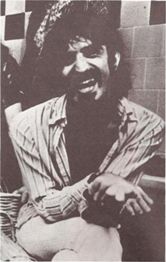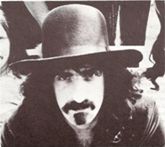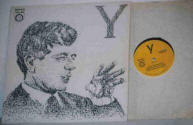ZigZag Unzips
By Dick Lawson
Frank Zappa interviewed by Dick Lawson at The Royal Albert Hall.
Over the last year or so, you have been thrust by the press into a position where you are an 'attitude spokesman' for what is happening in the States, which is presumably why you were asked to lecture at the L.S.E. the other day. What exactly happened?
I wound up speaking to a large number of unfortunately misdirected young people.
Who were expecting something political and sociological to come up?
I gave them something political and sociological. The only problem was, it didn't agree with what they thought the tactics for a youth revolution should be. And I can't buy their tactics because I think they're juvenile.
They were sort of trying to bring the Berkeley thing over here?
Yes, much in the same way as they imported "Flower Power".
In September 67, when you first came over, you were shouting things like "Flower Power Sucks" when half the audience had flowers behind their ears and were cringing in their seats.
Well I don't think I really made them cringe because when a person's really into that, he believes it for as long as it's fashionable and the problem with young people today is that they're not much more developed than their parents, you know. Their attitudes are slightly different in some regards, but the level of their individuality and their sociological development is only slightly better – and they are not, as they imagine themselves to be, the spearhead of some fantastic revolution that's going to turn the planet into some kind of Garden of Eden after they're done, because they're not. The main problem with what they advocate in terms of aggressive revolution and waving signs around in the street and boycotts and violence and all the rest of this stuff is a) it's a fad this season, and b) they don't offer any alternatives or anything better to replace the current situation with when they get done with their revolution. They're into revolution on a carnival level and they aren't thinking in terms of the best things for the most amount of people. You know, they aren't taking into consideration the millions of people who probably don't want to be 'hip and groovy'. They just want to be comfortable and sit around in their homes and, you know, I don't believe that it's my place or anybody else's place to tell them that they're not entitled to that.
It seems to me that you got very choked off playing and talking about this kind of thing, because you've come through 'Freak Out' and 'Absolutely Free' into 'Uncle Meat', where as you say, it's basically an instrumental thing. I mean, you're much more concerned with the music itself – the jazz ... it is jazz isn't it?
 No, it's not.
No, it's not.
Well what is it then?
It's contemporary American music – American because that's the environment that created it – Los Angeles and Now York.
In fact, with 'Ruben & the Jets', it would make one think that any spare time you have, which can't be much, you sit around listening to Del-Vikings and Gladiolas records and stuff like that.
Well, as a matter of fact, I do listen to those sort of records because I have a large collection of them, but I listen more to Stravinsky and Varèse than that, you know – almost to the exclusion of all other forms of pop music.
You don't listen to any of your contemporaries – groups and so on?
Outside the groups that I'm producing, during the time that I'm working on their project, no, I don't.
You've recently befriended Captain Beefheart....
I've known him 12 years.
Ah, well you appreciate he is a very big cult figure over here...
I think they're in for a very big surprise as to what Captain Beefheart is into and where he's at, because the two albums that you've heard over here were, I think, extremely badly produced and Beefheart himself has complained about what they did to him in the studio when he made those two albums because, the first album – it was studio players backing him up to a certain extent, and the second album mixed in a way that was against his wishes. There were certain things that he wanted to have in there, and the producer took it into the studio and put that phasing effect all over some of the stuff and turned it into a piece of shit. And so. And there were some interesting things on that album – I think 'Beatle Bones' is really a great song. We sing it on the bus. But the new album that he's just made is a 2 record set and the roots of that music are in Delta Blues and also in avant-garde jazz – like Cecil Taylor, Thelonius Monk and John Coltrane and a lot of other things. You can really hear that influence and it's perfectly blended into a new musical language. It's all his. And it bears no resemblance to anything anybody else is doing. And his words are also, you know, like "miles ahead of the field".
You don't find those influences influencing your work?
Those jazz figures? – to a small degree.
I would have thought that Ian Underwoods alto work...
Well, you've got to remember that when 'Uncle Meat' was recorded, Ian had just joined the group at that time and he had been working with jazz groups in New York, and it's pretty much in an Ayler type vein. And that type of music still influences some of his playing but it's foolish to, every time you hear someone improvise, to assume that it's jazz. One of the main problems we've had all along is making people realise that you can improvise in any given set of themes or chords or basic rules. I mean, is John Cage's music jazz – much of it is improvised.
OK, if that is what you were doing when 'Uncle Meat' was recorded, which was in 68?
'Uncle Meat' and 'Ruben & the Jets' were recorded simultaneously between October 1967 and February 1968.
 What sort of stuff are you into now?
What sort of stuff are you into now?
Electric chamber music.
And that's what you're going to play tonight.
Yes, quite a bit of it. That's what we've been doing on the tour and some of it's quite new. In fact five of the pieces were written on the plane coming over, and we've been rehearsing them in our hotel with just the bassoon and the flugelhorn and the clarinet.
So in fact, you're introducing new instruments as well?
Yes.
What was your reaction to the Festival Hall audience last year?
I was surprised that they didn't catch on to what we were doing quicker. They didn't at all, did they? No, they didn't. They missed the whole point of it. And another thing that's not generally known is that that show cost us 5,000 dollars just to get those musicians to record it, film it, get the costumes, make arrangements with the Hall itself to put on that kind of a show. It cost us money to do that. But I thought it was worth it. We recorded a very good album out of it, which will be our next record – out around July.
I read in Down Beat that you did a 45 minute set with Roland Kirk at a Boston Jazz Festival. Were you billed together, or did you just play together because Kirk was there?
We were on the same show and I met him after he had done his part and said "Would you be interested in playing with us?" And he said he didn't know. And I said "Well, you've never heard the group before – you don't know what we do. If you like it – come on out on stage and start playing, and we'll back you up". So we'd played for about five or ten minutes and he came wheeling out there with horns hanging all over him and blew his brains out.
It was completely free – nothing planned.
No, he just came bopping out there and we did it.
Got any plans to record together?
Well, he asked us to you know, but we haven't gone ahead with any special schemes yet.
Recently Kirk came over and played with Jack Bruce, Steve Stills, Buddy Miles and so on, in what many saw as an attempt to revitalise the group scene here. Did your getting together have any effect over there?
I didn't see that our meeting had anything to do with revitalising any group scene in the United States which was very sterile to begin with. But people form groups basically in order to get a hit. There is some evidence to the contrary. There seems to be a bit of creative work going into it but there aren't many really creative groups in the United States. Beefheart is certainly an exception and maybe one or two others.
What do you think of Billy Mundi's group (Rhinoceros)?
I saw them live in Canada and I was very impressed with this one they did called "Chickens" but the rest of what they were doing was pretty smooth teeny bop type material. These were tunes they were getting ready for their next album – and this piece "Chickens" sounds extremely like the Mothers of Invention, which is why I like it.
What do you think of the group scene over here. Have you seen any?
Only what I saw down at the Speakeasy a couple of times and I wasn't, you know, exceedingly enthralled by what I saw.
What about the groups that we're currently sending over ... like Jethro Tull and the Nice?
I like Jethro Tull and the organist in the Nice very much. I think he plays very well. I also like the Rolling Stones.
What about specific States groups?
I don't pay that much attention. There's probably lots going on but I get pretty involved in my small corner of it.
Who else are you recording apart from Beefheart?
We have Wild Man Fischer, a group called Alice Cooper, Judy Henske and Jerry Yester, we just bought 20 hours of Lenny Bruce tapes, we have Lord Buckley – the police did him under in New York a few years ago – and he was a sort of strange type of comedian – definitely an underground comedian of his time which was the '50s. We also have a documentary album on the Kennedy assassination – the last one – which is very interesting. It's got all the actual tapes of the assassination, interviews with Sirhan in his jail cell, interviews with the witnesses telling what they testified in court and what the police told them to say. [1]
How did you manage to get hold of all that?
A guy named Doug Moody put the album together and offered it to us and we packaged it and put it out.
You were quoted as having Tim Buckley, is it in fact Lord Buckley?
No, we are going to have Tim Buckley – as soon as his contract is up with Elektra – and that'll probably be September.
Well thank you very such – give our love to Captain Beefheart.
1.  This album was released on Solar Records - SLP-331. It is called "Y" and produced by Doug Moody.
This album was released on Solar Records - SLP-331. It is called "Y" and produced by Doug Moody.
Read by OCR software. If you spot errors, let me know afka (at) afka.net